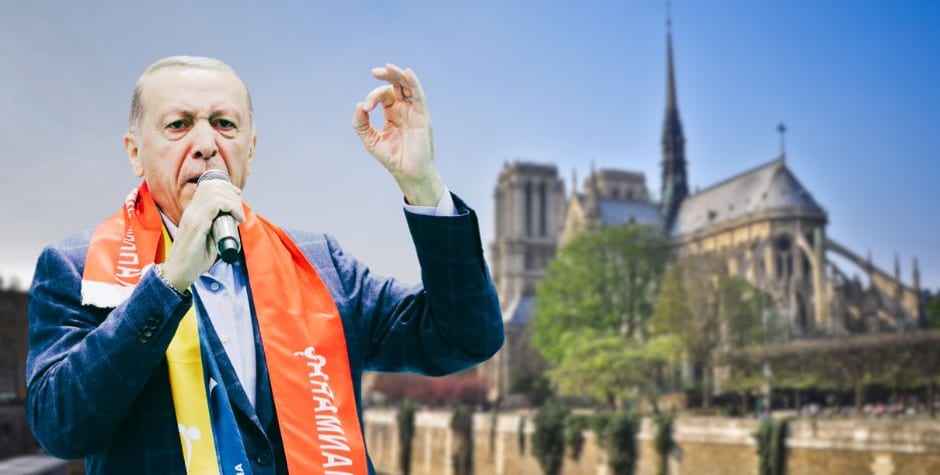

Erdogan: Champion of the Christian World in Paris, His Persecutor in Turkey
Erdogan: Champion of the Christian World in Paris...
Turkish President Recep Tayyip Erdogan is set to call Pope Francis to share his outrage regarding the opening ceremony of the Olympic Games in Paris. In return, Pope Francis is expected to ask Erdogan to stop persecuting Turkish Christians.
Article first published in the French weekly newspaper Valeurs Actuelles.
Around the world, many Christian religious leaders of all denominations deplored "scenes of derision and mockery of Christianity" (French Bishops’ Conference) at the opening ceremony of the Olympic Games in Paris on July 26. It took a week for the Holy See to react, on August 3, "saddened", deploring "the offence caused to many Christians and believers of other religions".
The damage has been done, whatever the denials of its artistic director Thomas Jolly and the amends made by Philippe Katerine, who appeared naked and painted blue, under a dome cover, believing himself to be imitating Dionysus. Perhaps intended to be grandiose and transgressive, the ceremony was merely obscene and conformist, having nothing to do with sport, nothing to do with France and even less to do with the Olympics.
Turkish President Recep Tayyip Erdogan, who had initially announced his visit to Paris on July 26 and 27 before leaving it in doubt, had finally abstained, claiming that his 13-year-old granddaughter had warned him "that they would organize an LGBT demonstration there". At the same time, Ankara is preparing to prevent Turkish pupils from accessing French schools in Turkey, demanding that Paris allows the opening of Turkish schools recognized by the French state. Following the ceremony, Erdogan condemned on July 30 "the immorality committed against the Christian world and against all Christians". He even announced his intention to call Pope Francis on the matter, explaining that "the Olympic Games have been used as a tool of perversion that corrupts human nature".
It's a cheap indignation for Erdogan, faced with a parody of the Last Supper in which the apostles are replaced by drag-queens and Jesus Christ by a militant LGBT DJ proudly claiming to be a "fat lesbian". As Jesus Christ is considered a prophet in Islam and therefore a figure to be respected, even Al-Azhar University expressed its anger, explaining that "Muslims consider that insulting Jesus, peace be upon him, or any other prophet, peace be upon them, is a disgrace for the perpetrators of this odious insult and for those who accept it".
Erdogan defends Christians abroad, but persecutes them at home
Erdogan's sudden outrage at anti-Christian blasphemy should not obscure the fact that Turkish anti-blasphemy legislation applies in reverse against Christians. In Turkey, Article 216(3) of the Penal Code allows the judiciary to send to prison anyone who "publicly denigrates the religious values adopted by a part of the population", even for posting a photo showing a bottle of alcohol in a mosque. Elsewhere, in Pakistan, perfectly innocent Christians are arbitrarily condemned to death for alleged blasphemy against Islam, which serves above all to settle scores, as is currently the case with Shazad Masihor previously Asia Bibi, who has since been exiled to Canada.
Erdogan, champion of the Christian world on the outside, needs to put his own house in order first, since he persecutes Christians at home, and Pope Francis should remind him of this. Article 24 of the 1982 Constitution protects everyone's right to freedom of conscience, belief and religious conviction. Yet Christians are under intense pressure from Turkish society, which is steeped with both religious and ethnic nationalism. The U.S. Commission on International Religious Freedom (USCIRF) recommends that the U.S. State Department specially monitor Turkey "for practicing or tolerating severe violations of religious freedom" (Special Watch List). The NGO Portes Ouvertes ranks Turkey 50th in its 2024 World Christian Persecution Index.
Turkey does not even grant historic Christian communities the rights it committed itself to protecting under the 1923 Treaty of Lausanne. Christian Turks of the Armenian or Greek rite are still considered "non-Muslim minorities" with a status inferior to that of Muslim Turks. The evolution of relations between the Turkish state and the Ecumenical Patriarchate of Constantinople depends on its relations with the Greek state. More recent Christian communities, mainly evangelical converts from Islam, are also seen as disloyal, under Western influence. Turkish converts are under pressure from both family and society to renounce their Christian faith.
The Greek Orthodox and Evangelical communities take Turkey to the ECHR
More specifically, the Greek Orthodox community is regularly confronted with the spoliation of its assets by the Directorate General of Foundations. Its seminary at Halki, on the island of Heybeliada, has remained closed since 1971. The Prinkipo orphanage on the island of Büyükada, closed in 1964, was finally returned (in ruins) in 2012, following a ruling by the European Court of Human Rights. In April 2024, the European Centre for Law and Justice (ECLJ) intervened in a case pending against Turkey, which had described as "disused" the foundation of a Greek Orthodox monastery whose activity had never ceased. A recent application concerns clergymen who are forbidden by Turkey to become members of the boards of Greek Orthodox foundations.
As for evangelical Christians, denied access to training for their clergy, as well as basic religious education, they have to rely on foreign support. Except that since 2018, around 200 foreign Protestants, some married to Turkish citizens, have been expelled or banned from returning to Turkey, often without justification other than a vague national security motive, or access to intelligence reports. As an emblem of this systemic persecution, another case brought before the ECHR concerns an American Protestant who had been legally residing in Turkey for over thirty years, and was suddenly barred from returning there after one trip.
SIGNATURES












